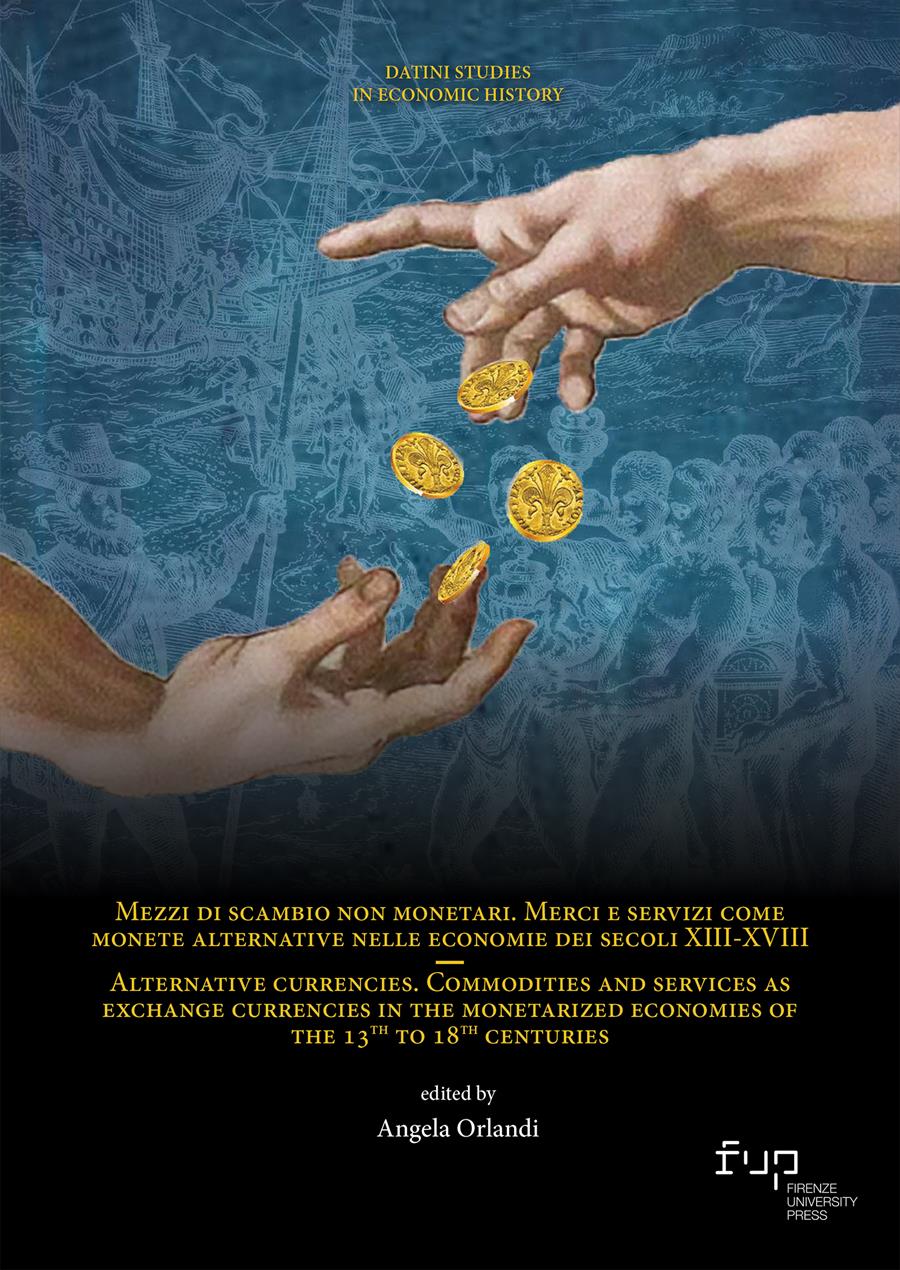Pratiques du troc, industries et stratégies individuelles (Lodévois et Vallespir, XVe siècle-vers 1550)
- Lisa Caliste
- Catherine Verna
- © 2024 Author(s) |
- CC BY 4.0
- DOI: 10.36253/979-12-215-0347-0.21
In the southern industrial districts of Vallespir (Roussillon) and Lodévois (Languedoc), exchanges in kind (in goods and services) are common practice, some of which has been recorded by notaries. Based on a corpus of 425 notarial deeds, it is possible to examine the legal conditions of 'barter', the categories of goods exchanged (all of which are manufactured locally) and their market prices. In both districts, payments in kind are part of everyday exchanges: people exchange what they have in order to obtain a product they need. Merchants and drapers also barter, for wollen cloth and iron, which are exported to international markets. In this case, barter is a way to obtain products making a profit and controlling the workforce. Thus, regardless of their social or professional identity, economic players take part in barter and make payment in kind out of a choice between necessity and profit.
- Keywords:
- Middle Ages,
- industrial district,
- market,
- barter,
- payment in kind,
Arscan (UMR 7041), France
Vincennes-Saint-Denis Paris 8 University, France - ORCID: 0000-0001-9341-6918
- Bompaire, Marc, et Antoine Furió. 2014. “Monnaie, crédit et fiscalité dans le monde rural autour de 1300: réflexions introductives.” In Dynamiques du monde rural dans la conjoncture de 1300: échanges, prélèvements et consommation en Méditerranée occidentale, ed. Monique Bourin, François Menant, et Lluís To Figueras, 367-80. Rome: École française de Rome.
- Caliste, Lisa. 2021. Le Lodévois et ses marges. Industries, ateliers et entreprises (vallées de la Lergue et de l’Hérault, XVe siècle), thèse de doctorat d’histoire, sous la direction de Catherine Verna, Université Paris 8 Vincennes-Saint-Denis (L’industrie en Lodévois. Des ateliers, des hommes et des marchés (XVe siècle). Paris: Classiques Garnier (à paraître).
- Fabre, Camille. 2021. Commerce et marchandisation du bois à Toulouse à la fin du Moyen Âge. Paris: Classiques Garnier.
- Feller, Laurent, et Catherine Verna. 2012. “Expertises et cultures pratiques.” In Experts et expertise au Moyen Âge. Consilium quaeritur a perito, 42e Congrès de la SHMESP (Oxford, 31 mars-3 avril 2011), 27-44. Paris: Publications de la Sorbonne.
- Labarthe, Marie-Hélène. 2002. “La suma de la art de arismetica de Francesch Sanct Climent.” Domitia, 2: 63-88.
- Lamassé, Stéphane. 2005. “Calculs et marchandises (XIVe-XVe siècles).” In La juste mesure. Évaluer, quantifier et mesurer entre Orient et Occident (VIIIe-XVIIIe siècles), ed. Laurence Moulinier, Line Sallmann, Catherine Verna, et Nicolas Weill-Parot, 79-97. Saint-Denis: Presses universitaires de Vincennes.
- Pinto, Anthony. 2005. “Le commerce des chevaux et des mules entre la France et les pays catalans (XIVe -XVe siècle.).” Histoire et Sociétés rurales, 23: 89-116.
- Reyerson, Kathryn L., et Salata, Debra A. 2004. Medieval notaries and their acts: the 1327-1328 register of Jean Holanie. Kalamazoo. Mich.: Medieval Institute Publications.
- Verna, Catherine. 2013. “Élites rurales, industries et fortune.” In Élites rurales méditerranéennes au Moyen Âge, Mélanges de l’École française de Rome, Moyen Âge, 124-2, ed. Laurent Feller, Michel Kaplan, et Christophe Picard, 461-78. Rome: École française de Rome.
- Verna, Catherine. 2017. L’industrie au village. Essai de micro-histoire (Arles-sur-Tech, XIVe et XVe siècles). Paris: Les Belles Lettres.
- Verna, Catherine. 2018. “Les affaires de l’entrepreneur Pere Comelles (Vallespir XVe siècle.” In La fabrique des sociétés médiévales méditerranéennes. Les Moyen Âge de François Menant, ed. Diane Chamboduc de Saint Pulgent, et Marie Dejoux, 279-87. Paris: Publications de la Sorbonne.
Chapter Information
Chapter Title
Pratiques du troc, industries et stratégies individuelles (Lodévois et Vallespir, XVe siècle-vers 1550)
Authors
Lisa Caliste, Catherine Verna
Language
French
DOI
10.36253/979-12-215-0347-0.21
Peer Reviewed
Publication Year
2024
Copyright Information
© 2024 Author(s)
Content License
Metadata License
Bibliographic Information
Book Title
Mezzi di scambio non monetari. Merci e servizi come monete alternative nelle economie dei secoli XIII-XVIII / Alternative currencies. Commodities and services as exchange currencies in the monetarized economies of the 13th to 18th centuries
Editors
Angela Orlandi
Peer Reviewed
Number of Pages
592
Publication Year
2024
Copyright Information
© 2024 Author(s)
Content License
Metadata License
Publisher Name
Firenze University Press
DOI
10.36253/979-12-215-0347-0
ISBN Print
979-12-215-0346-3
eISBN (pdf)
979-12-215-0347-0
eISBN (xml)
979-12-215-0348-7
Series Title
Datini Studies in Economic History
Series ISSN
2975-1241
Series E-ISSN
2975-1195
